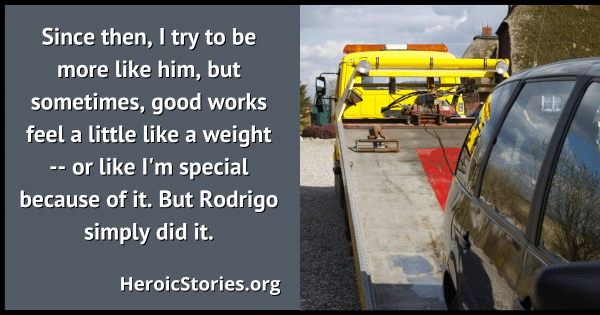by Camilla Flores
Brazil

I work at a multinational company in Brazil. In 2003, headquarters sent us a Lean Operation Manager. Mr. Thomas was from Germany, and as his secretary, I struggled to communicate with him in his limited English, as he spoke no Portuguese.
Rushing to the airport to return to his family in Germany, Mr. Thomas crashed his rented Mercedes. He called, speaking rapidly in German, and I panicked. I couldn’t understand, and he was very far away.
A young man stopped. Sao Paulo is not a safe city. It’s recommended you don’t talk to strangers. This man showed his company credentials to ease any fears. To our extreme relief, Rodrigo spoke fluent English.
Mr. Thomas handed him the phone, and Rodrigo’s calmness soothed me. I was a nervous wreck, but Rodrigo said he’d stay until the tow truck arrived. His chatting calmed my boss.
Then a public tow truck driver arrived, saying he must move the car to a gas station! Rodrigo volunteered to take Mr. Thomas, but the driver wouldn’t tow an unattended car. Rodrigo talked to him, and I heard the truck driver’s loud laugh. The truck driver pulled the Mercedes unattended.
Rodrigo drove away from his destination to the gas station. With our insurance company’s tow truck hours away, my boss and I were stunned. Mr. Thomas would miss his flight if he waited, but who would hold the car keys for the insurance company’s driver? Rodrigo convinced us everything would be all right. He refused our requests to plead with the tow driver to wait. “He’s helped us enough.”
He asked the gas station manager to give the keys only to the insurance driver. The manager didn’t want to take responsibility. Rodrigo said he knew he could count on him. He was so firm and confident that the man replied, “Sure.” Listening via phone, I was amazed at his ability to inspire others to do good.
We learned the cab wouldn’t make it. Too much traffic. Rodrigo simply said, “Apparently, we’ll have to spend a little more time together.” Mr. Thomas replied, “You’ve done too much!” Rodrigo was on the way to his college work group, and this had intruded. But Rodrigo had already opened the Mercedes’ trunk and gotten the bags.
It took two hours to get to the airport and they barely made the flight, but Rodrigo kept Mr. Thomas’s mind off the clock. On arrival, Mr. Thomas offered US $100.00 for his trouble and gas, but Rodrigo refused payment and rushed Mr. Thomas to check in. Rodrigo was genuinely happy to help a stranger. His cheerfulness prevented despair; Mr. Thomas actually had a good time.
What a blessing to meet such a person! We should all be Rodrigos. Since then, I try to be more like him, but sometimes, good works feel a little like a weight — or like I’m special because of it. But Rodrigo simply did it.
A trainee then, he must be a director now. Such a special person couldn’t go unnoticed. I wish I could tell him how he touched our lives. He deserves to hear it!
Podcast: Play in new window | Download (Duration: 4:35 — 3.5MB)


Had to read this a few times to understand it, but well worth it. I have a friend living in S. America, and the rule about not trusting a stranger can save your life there. This is a rare person we can all emulate, and know that we truly ARE special when we succeed!
I admire Rodrigo’s calming presence and communication style. That is a true asset in a crisis, or even a precieved crisis!
I was totally confused by what happened in this story. I suggest a total re-write and present it again in less confusing detail.
It was like “Who’s on First”
To all who struggled reading this story: Please note that the author is most likely from Brazil and her English is limited (as noted in the story).
Please keep that in mind when commenting.
Having visited and lived in South America, I can attest to both the good and the bad that can happen when you encounter strangers. However, as in many large cities in the United States, more often than not the people are good or indifferent, not bad or evil.
A few days late to read/respond to this story… but hopefully othes will see/share these thoughts. I’m more puzzled by the comments by the readers that say they were confused by the organization of this story. Maybe it’s the result of having worked with numerous persons from foreign (to the U.S.A.) nations or having lived and traveled overseas for extended periods where English was/is not the predominate language, but I had no problem following the author’s narrative. May this story serve us all to be patient with those whose native language is different than our own because the ways stories are told will often differ as well.